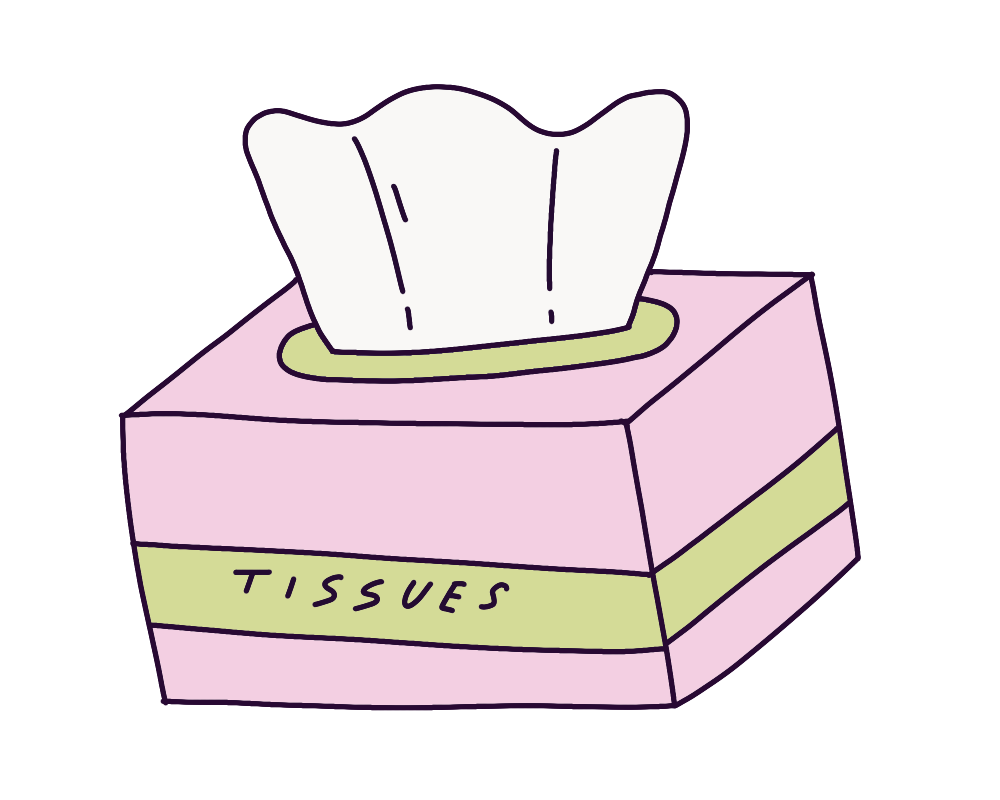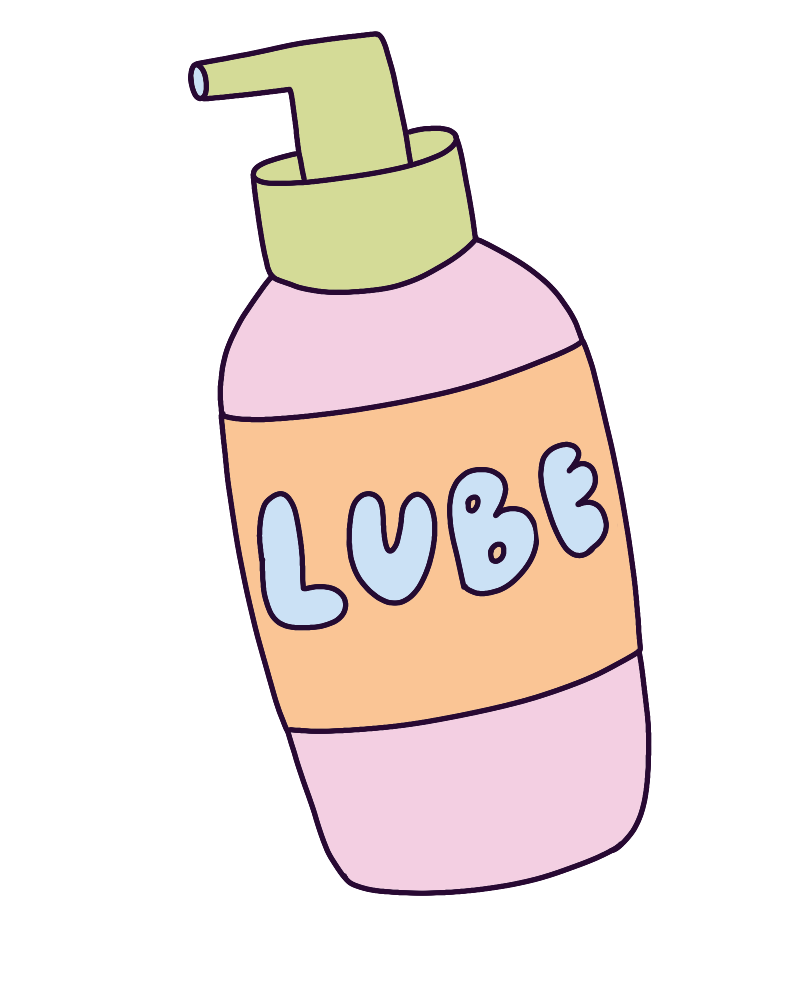Different types of sex
The wide world of sex and intimacy is diverse. Sex isn’t just one thing, it’s a whole range of things

⚠️ Content Warning!
This page describes different types of (consensual) sexual activity. You can skip this page if you are not ready or not comfortable reading about this.
Let’s get down to business
What are the types of sex that someone might explore? And what are some of the misconceptions or myths that we might have picked up about them?
What is masturbation?
Masturbating, also known as 'wanking', 'jerking off', or 'flicking the bean', is basically self pleasuring the genitals. It’s something that almost everybody does, although a lot of the conversation and language we have around it focuses on men with a
It’s commonly done while watching porn or imagining a sexual encounter. Some people also enjoy ‘edging’, or masturbating to maintain a sustained level of arousal in order to prolong pleasure.
Why do people do it?
People do it for a lot of reasons. First off, it feels good. It can also be a way for you to connect with your own body, with or without another person. Sometimes people do it because they are bored, stressed, lonely, or even to relieve pain. It can be a good way to get to know what you like and how your body responds.
There can be shame associated with masturbation but it’s actually something that most people do. It’s become a bit of a joke in our culture - if you don’t like someone you call them a ‘wanker’ or a ‘jerk’.
A lot of young women may also feel like it’s weird or sexually deviant to masturbate, but it’s just as normal for women as it is for men to do it. You are allowed to enjoy your own company.
🧐 Did you know?
Across Australia, approximately 90.3% of young people (Years 10 - 12) masturbate - making this the most common type of sexual activity that young people do!
Source: "7th National Survey of Australian Secondary Students and Sexual Health 2021" (LaTrobe University). Read more [here] .

What are handjobs or fingering?
‘Handjobs’ for someone with a penis, or ‘fingering’ for someone with a
Why do people do it?
It feels good. It can be a way for partners to connect. There is a low to no risk of
Like solo masturbation, handjobs, fingering or mutual masturbation can be something you do before you are ready for other types of sex, or it may remain one of the main things you like to do.
🧐 Did you know?
Across Australia, about 65% of young people (Years 10 - 12) have touched their partner’s genitals, or have been touched by their partner on the genitals.Source: "7th National Survey of Australian Secondary Students and Sexual Health 2021" (LaTrobe University). Read more [here] .
What is penis-in-vagina sex?
You’ve probably heard about this one. It gets a lot of coverage in sex education because it’s what can lead to babies. It’s when a person puts their erect penis inside someone’s vagina.
Positions
There are a bunch of different positions and techniques. You may have seen some of them in the media and in porn. However the sex you’ve seen in porn is often designed to look good for camera, rather than to feel good for the people doing it. Different positions can impact on experiences of pain or pleasure. What is more pleasurable for one partner may not be equally pleasurable for the other. This is why ongoing communication is important.
Different positions mean different angles, different parts of the body are stimulated, different depth is possible. This can make it more pleasurable or more painful. This is generally not shown in porn. In fact, sometimes what can look like someone screaming with pleasure might in reality be them screaming in pain.
We’re not going to break down the pros and cons of every position but here are some basics.
Person with vagina on top (or 'cowgirl' for
Doggy style is where the person is on their hands and knees, and penetrated from behind. It allows for a lot of depth which can feel great for the person with a penis (who is penetrating), but can be uncomfortable for some people with a vagina (being penetrated).
Missionary is where both people are facing each other with one on top of the other who is lying down. This is a relatively equal position, however it’s still important to check in with one another to see how it feels.
Even if it seems like the penetrating partner is having a good time, the one who is being penetrated shouldn’t just have to 'take it'. If things aren’t working, you can always swap to another type of sex for a while. There needs to be open communication about things, like:
- Pace (how fast or slow)
- Position (doggy? missionary?)
- Lubrication (wet enough?)
Mutual masturbation, kissing and oral sex might help get things warmed up. Sometimes in porn, the penetrating partner will just change the position without communicating or checking in with their partner to make sure everything is okay. Before making decisions around changing positions, we should always negotiate consent . Changing position too quickly can impact on the experience of comfort or discomfort, pleasure or pain, for each person. It can also impact on the sense of connection between partners by breaking the flow. As a rule, always check in.
Why penis-in-vagina sex?
Most people do it because it’s fun and feels good. It can be a way for partners to connect. Some people have penis-in-vagina sex to have children, but here we’ll be mainly talking about sex for pleasure.
This type of sex is often seen as the ‘main event’ — and it’s what most people are referring to when they talk about sex. There can be a lot of importance placed on the first time someone has this type of sex, for example, in the idea of ‘losing your virginity’. This idea of virginity has roots in this type of sex as the main way of reproducing, and of men wanting to ensure the ‘purity’ and fidelity of their reproductive partners. But you might ask, if all of these different activities are sex, then what does ‘losing’ your virginity really mean?
There are also double standards around men’s and women’s pleasure, when it comes to penis-in-vagina sex for heterosexual couples. This contributes to the ‘orgasm gap’ where men’s pleasure is prioritised over women's. This often means that penis-in-vagina sex can often be prioritised over the types of sex where a person with a vagina is more likely to orgasm . This is why it is important for partners to keep communicating to make sure that everyone is enjoying themselves, and not only following a script.
🧐 Did you know?
Across Australia, about 52% of young people (Years 10 - 12) have had penis-in-vagina sex.Source: "7th National Survey of Australian Secondary Students and Sexual Health 2021" (LaTrobe University). Read more [here] .

What’s anal or butt play?
Anal play, also known as ‘butt play’, is what it sounds like: sexual activity that involves the butt. This can refer to things like penetrative anal sex (e.g. with a penis, or with toys), digital penetration (e.g. with fingers), or rimming (i.e. stimulating the anus with the mouth and tongue).
Why anal or butt play?
Because it’s fun for many people! Like with other forms of sex, many young people today first learn about anal sex by watching porn. No matter your sex or gender, everyone has a butt! This means that anyone can experience butt play.
However, unlike penis-in-vagina sex, there are very few other places to learn about anal sex - about what it might look and feel like, and how you can prepare yourself physically and mentally. There can be a strong stigma associated with the bum, and many people can feel squeamish about this.
First off, some people are squeamish about the butt because that’s where poo comes from. That’s true, but it doesn’t mean that anal sex is dirty or more unsafe, as long as it is practised in a safe and healthy way.
The stigma associated with anal sex can also be about homophobia . However, not all people who have anal sex are gay men. Some heterosexual couples have anal sex too. At the same time, there are also many gay men who do not enjoy anal sex. Some gay men refer to themselves as ‘sides’, meaning that anal sex is off the menu for them. So, having anal sex doesn’t make you gay, and being gay doesn’t mean you have to have anal.
For many individuals with a prostate , consensually stimulating the prostate can be pleasurable. Straight men may also enjoy being penetrated, such as with a finger, with toys or with their partner’s strap-on .
No matter your sexuality, just like with any other sexual activity, anal sex should never be ‘compulsory’. And, just like with any other kind of sex, you are allowed to change your mind at any stage, even if you have said ‘yes’ at first. Anal sex is shown a lot in porn, but what isn’t shown is the negotiation between partners on whether it is something that they are into or not.
Preparing for butt playFirst off, like with all types of sex communication, negotiation and consent are a must. In general, this isn’t something you can just try without talking about it first. Anal sex can require a little bit more preparation than other forms of sex. It is particularly important to start slowly and gently and use lots and lots of lube.
The lining of the anus can bruise and tear easily, even if you cannot see it or feel it. This can make unprotected anal sex riskier for certain STIs. Unlike the vagina or mouth, the anus has no natural lubrication, so it is important to use a water-based or silicone-based lube, as these types of lube are also latex-friendly (so they can be used with most latex condoms to prevent STIs!).
Anal douching can help some people feel less self-conscious about poo, but it’s not actually necessary and can have its own risks, like impacts on gut health. Just making sure you’ve gone to the bathroom beforehand and had a shower or a bath can be enough. Read more about douching here.
In terms of safety, also note that going straight from anal to vaginal or oral can spread germs. It’s best to use a condom for anal sex and change condoms before going for another body part.
🧐 Did you know?
Across Australia, approximately 15% of young people (Years 10 - 12) have had penetrative anal sex, making it the least reported form of sex that young people have.
*Source:7th National Survey of Australian Secondary Students and Sexual Health 2021 (LaTrobe University).
Read more [here] .
What is oral sex?
Oral sex, also known as 'blowjobs' or ‘going down on someone’, is using your tongue and mouth on the genitals to create sexual pleasure. It is also known as 'cunnilingus' if giving to someone with a
Why do people do it?
Because it can be pleasurable. Obviously for the person receiving, but also for the person giving, as it can feel good to give someone pleasure.
Some people with vaginas are less likely to orgasm during penetrative sex, and so oral sex (stimulating the clitoris) can be a good option to ensure mutual pleasure.
Do I have to do it?
You don’t have to do anything you don’t want. It might feel better when it is something that you are both giving and receiving, rather than only one way, but equally it may just not be for you.
Do I have to like it?
Giving or receiving oral sex may not be your thing, and that’s OK! Talk to your partner, negotiate consent.
How do I do it?
We’re not going to give you the blow by blow 🤭 on the techniques of oral sex. But we’ll provide links if you’d like to know more.
What we will say is that if you are giving oral sex to someone with a penis you don’t need to deep-throat, gag, or swallow like is often shown in porn.
You can find more info about technique here .
🧐 Did you know?Across Australia, approximately 1 in 2 young people (Years 10 - 12) have either given or received oral sex.
Source: "7th National Survey of Australian Secondary Students and Sexual Health 2021" (LaTrobe University). Read more [here] .
What is frotting?
Frotting refers to direct penis-to-penis contact, between people who have a penis.
Why do people do it?
For many, it is fun! It can also be psychologically less risky for many people, compared to penetrative sex, as a way to experience sexual intimacy without having to worry as much about STIs (except for skin-based ones, such as HPV or pubic lice).
Preparing for frotting
As with all types of sex, consent is crucial. Also lube, lots of lube.
Myths
For some cis gay men, there may be pressure to have penetrative anal sex, when this is not the only thing they want to enjoy. For many, frotting can be extremely intimate and something they enjoy alongside, or as an alternative to penetrative sex.
What is scissoring?
Also known as ‘tribadism’ or ‘tribbing’, scissoring refers to direct genital contact, between people who have a vulva.
Why do people do it?
For many, it is fun! In practice, scissoring is not necessarily about vaginal penetration, but is more about mutual stimulation of the clitoris.
Myths
Culturally, a long history of both sexism and homophobia can lead many people to believe that any type of sexual activity that does not involve penetration or a penis, such as scissoring, is not ‘real sex’.
What are sex toys?
Sex toys are objects people use to create or increase pleasure during sex. They can be used during both partnered and solo sex and come in a wide range of forms. There are:
- Toys that vibrate (like vibrators or some penis rings)
- Toys that penetrate (like dildos and strap-ons)
- Toys that simulate certain kinds of sex (like oral sex simulators or penis-in-vagina or anal sex)
- Toys that are designed to make sex more accessible for people with disabilities (for example, toys that have easy to use buttons, hands-free or automatic grips)
- Toys that stimulate both partners at the same time (like a dual-ended strap on)
… and that’s just to name a few!
Why do people use sex toys?
Sex toys are fun to use and feel good, whether you’re on your own or with a partner. They can help you get more creative in the bedroom, or let you experiment with different ways of having sex.
Sex toys can also make sexual pleasure more accessible for some people with disabilities, and some members of the LGBTQIA+ community, by providing them with toys that are easier to use or that match up with their sexual preferences or gender identity.
They can even help partners in long-distance relationships stay intimate when they’re apart.
Taking care of your sex toys
There’s a bit of maintenance involved in using sex toys. This includes:
- Picking the right lube for your toy. Silicone-based lube on silicone toys can potentially affect the silicone toy over time.
- Using different condoms for different moments of penetration in a sexual encounter. This will help prevent bacteria and viruses from spreading. For example, you may not want to put a toy into your vagina right after putting it in your butt!
- Cleaning toys after enjoying them. You can either use a soapy washcloth and a bit of water, or a specialised sex toy cleaner.
- Keeping your toys to yourself. When it comes to sex toys, sharing isn’t caring. Even if you’ve washed your toys carefully, there’s still a chance it can lead to the transfer of bacteria or viruses. If you and the person you’re having sex with both enjoy sex toys, it is better to use separate sets.

Using sex toys with a partner can mean your partner is listening to your sexual needs or interests, and looking for ways to ensure they’re properly and fully met.
Toys can also add to, or be just as pleasurable as other forms of sex, as they’ve been designed to simulate the feelings physical sex can give you.
What is outercourse?
Outercourse refers to activities that can give sexual pleasure or create physical intimacy without requiring penetration. It can include things like touching one another, making out, sensual massages, or even just talking about your fantasies while holding your partner.

Why do people do it?
Outercourse has lots of benefits for people who aren’t ready for penetrative or genital-based sex yet, or for people who just aren’t into
Myths
Other words that people have used to describe outercourse include words like 'foreplay'. However, this word can be misleading - it implies that outercourse is something you do before intercourse as the main event, when that’s not always the case. Remember that it is up to you and your partner to communicate with one another what forms of sexual or physical intimacy are good for you.
🧐 Did you know?Across Australia, about 7 in 10 young people (Years 10 - 12) have enjoyed deep kissing. It is the 2nd most common form of sexual activity among young people, after solo sex or masturbation.
Source: "7th National Survey of Australian Secondary Students and Sexual Health 2021" (LaTrobe University). Read more [here] .
What is abstinence?
Abstinence traditionally means abstaining from sex, or choosing not to have sex. Abstinence is different from wanting to have sex, but feeling like you can’t, or are not allowed to. However, abstinence can also mean different things to different people.
You might practice abstinence about one thing (like not having penetrative sex), while choosing to enjoy something else (like kissing or mutual masturbation).
Why abstinence?
People across the sex, sexuality and gender spectrum choose abstinence for many different reasons.
For example, you might:
- Be
asexual . - Have certain religious or other cultural commitments around sex, which means that abstinence is right for you now.
- Be figuring out your gender, or choosing to socially or medically transition with gender-affirming hormones or surgery, and you’re not comfortable with having sex until you feel more affirmed in your own body and gender.
- Have a physical or health condition, such as temporary or chronic illness, or a disability that impacts your ability to give or receive sexual pleasure.
- Have concerns about contraception, pregnancy and managing STI risk.
- Have had a previous traumatic experience with sex, which means that you may not be ready for sex again or at all.
- Not have privacy or space where you feel safe and in control (for example, if you are still living with your parents).
- Or you may simply not want to have sex right now, although that doesn’t mean it’s off the table in the future.
Myths and truths
People of all backgrounds may choose to be abstinent for many different reasons, whether or religious or personal reasons. Some may choose to go from being sexually active to being abstinent, in order to better understand themselves or their personal needs.
Abstinence means they’ve made a choice about what’s right for them. It is normal to not have had sex, but you might not see yourself as ‘abstinent’.
It is true that some people may have been taught abstinence-only sex education, which can be harmful. Abstinence-only sex education ignores the fact that many young people can, will and do enjoy sex and porn.
However, most people who are consciously and independently abstinent are familiar with the pros and cons of sex, and are making a considered choice to abstain.
Abstinence takeaway
Just as no one should ever pressure you into sex, no one should ever pressure you into being abstinent. It needs to be a choice you make for yourself, without fear of punishment.
You are allowed to change your mind about whether or not abstinence is right for you, at any stage, as long as you are clear on the reason behind your change of mind, and you’re still also respectful of others’ needs and boundaries.
Reflection
What are some myths about sex that have influenced you in your life?
Not everyone is interested in, or can have penis-in-vagina sex. In addition, approximately 80% of cis women cannot orgasm from penis-in-vagina sex alone.
Medical conditions, speed or intensity, lack of lubrication, sex that’s too fast or hard, not being warmed up enough, or even the size of their partner’s penis, can make sex sometimes painful for cis women, or for anyone with a vagina. However, this doesn’t mean that painful sex should be the norm. In fact, painful sex is often a sign that something needs to change.
There are things you can do to make things more enjoyable and less painful, such as communicating about what feels good and what doesn’t before or during sex, using more lube, adjusting your pace or position, or even pausing or stopping sex all together, to focus on something else you enjoy.
When someone with a vulva gets sexually excited, the vagina can self-lubricate itself in preparation for penetration.
However, this process doesn’t happen for all people with a vulva, and the level of wetness for can vary, no matter how turned on somebody is. Squirting is even less common.
Sex can be fun and pleasurable, even if you or your partner don’t orgasm.
An orgasm isn’t the defining event of sex. In mainstream porn, the video usually ends when the man ejaculates, making it seem like this is it. You are allowed to stop having sex before orgasm, or keep going after.
In fact, making it your goal to orgasm or make your partner orgasm every time can add unnecessary pressure and stress. It can also be tricky for men and women to achieve an ‘equal’ amount of orgasms, as they may prioritise their pleasure differently.
Rather than focusing on orgasms, it can help to check in on what your partner wants or what they like. They may not always be interested in orgasming or may have specific ideas of the kind of pleasure they’d like to experience.
Unlike what you see on screen, sex doesn’t always happen in one continuous and progressive take. It’s normal and perfectly natural for you to need a change in pace, a chance to get warmed up again, a chance to catch your breath, or even a toilet break.
Everyone’s level of sexual desire is different. Our culture tells us that men are driven by sex. However, it isn't always true that men have a stronger sex drive than women. It is true that hormone levels, the nature of your relationship, and other environmental, cultural and even economic factors can influence people’s sex drives differently, which look like gender differences.
Expecting men to always be interested and ready for sex can put unfair pressure on men to always initiate sex, even if they're not actually ready. Beliefs such as 'boys will be boys' and 'men just can’t help themselves' are actually damaging beliefs about men’s capacity for self-control. Men being 'out of control' is not an excuse to minimise the importance of negotiating consent.
For men with a penis, it's important to note that erections come and go, and not all men want to have sex all the time. Feeling pressured can make it more difficult to get or stay hard.
There are many things that can also impact on erections, such as anxiety, stress, and some medications. If someone loses their erection, it doesn't mean that they aren’t into you! It may be that they are nervous, or may want to have more of a connection with you before going further.
Sex plays a different role in different people’s lives. Desire for sex can vary at different times. Things like getting sick, being on certain medications, or just being really stressed can impact on your desire for sex.
Regardless of gender, many people are on the asexual spectrum, and may never, or only very rarely, experience desire for sex. However, many asexual people still enjoy and desire relationships, physical intimacy and connection. You can read more about asexuality [here].
Help us improve this info by letting us know how you found it.
Start
Orgasms
